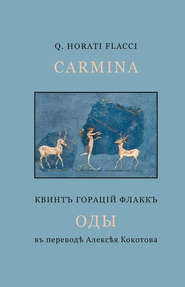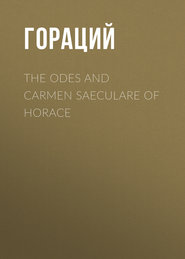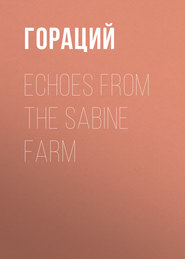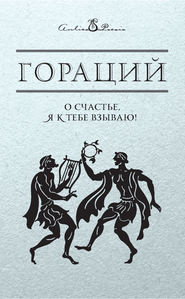По всем вопросам обращайтесь на: info@litportal.ru
(©) 2003-2024.
✖
The Works of Horace
Настройки чтения
Размер шрифта
Высота строк
Поля
ODE XIII.
TO LYDIA.
O Lydia, when you commend Telephus' rosy neck, and the waxen arms of Telephus, alas! my inflamed liver swells with bile difficult to be repressed. Then neither is my mind firm, nor does my color maintain a certain situation: and the involuntary tears glide down my cheek, proving with what lingering flames I am inwardly consumed. I am on fire, whether quarrels rendered immoderate by wine have stained your fair shoulders; or whether the youth, in his fury, has impressed with his teeth a memorial on your lips. If you will give due attention to my advice, never expect that he will be constant, who inhumanly wounds those sweet kisses, which Venus has imbued with the fifth part of all her nectar. O thrice and more than thrice happy those, whom an indissoluble connection binds together; and whose love, undivided by impious complainings, does not separate them sooner than the last day!
ODE XIV.
TO THE ROMAN STATE.
O ship, new waves will bear you back again to sea. O what are you doing? Bravely seize the port. Do you not perceive, that your sides are destitute of oars, and your mast wounded by the violent south wind, and your main-yards groan, and your keel can scarcely support the impetuosity of the waves without the help of cordage? You have not entire sails; nor gods, whom you may again invoke, pressed with distress: notwithstanding you are made of the pines of Pontus, and as the daughter of an illustrious wood, boast your race, and a fame now of no service to you. The timorous sailor has no dependence on a painted stern. Look to yourself, unless you are destined to be the sport of the winds. O thou, so lately my trouble and fatigue, but now an object of tenderness and solicitude, mayest thou escape those dangerous seas which flow among the shining Cyclades.
ODE XV.
TO PARIS.
When the perfidious shepherd (Paris) carried off by sea in Trojan ships his hostess Helen, Nereus suppressed the swift winds in an unpleasant calm, that he might sing the dire fates. "With unlucky omen art thou conveying home her, whom Greece with a numerous army shall demand back again, having entered into a confederacy to dissolve your nuptials, and the ancient kingdom of Priam. Alas! what sweat to horses, what to men, is just at hand! What a destruction art thou preparing for the Trojan nation! Even now Pallas is fitting her helmet, and her shield, and her chariot, and her fury. In vain, looking fierce through the patronage of Venus, will you comb your hair, and run divisions upon the effeminate lyre with songs pleasing to women. In vain will you escape the spears that disturb the nuptial bed, and the point of the Cretan dart, and the din [of battle], and Ajax swift in the pursuit. Nevertheless, alas! the time will come, though late, when thou shalt defile thine adulterous hairs in the dust. Dost thou not see the son of Laertes, fatal to thy nation, and Pylian Nestor, Salaminian Teucer, and Sthenelus skilled in fight (or if there be occasion to manage horses, no tardy charioteer), pursue thee with intrepidity? Meriones also shalt thou experience. Behold! the gallant son of Tydeus, a better man than his father, glows to find you out: him, as a stag flies a wolf, which he has seen on the opposite side of the vale, unmindful of his pasture, shall you, effeminate, fly, grievously panting:—not such the promises you made your mistress. The fleet of the enraged Achilles shall defer for a time that day, which is to be fatal to Troy and the Trojan matrons: but, after a certain number of years, Grecian fire shall consume the Trojan palaces."
ODE XVI.
TO A YOUNG LADY HORACE HAD OFFENDED.
O daughter, more charming than your charming mother, put what end you please to my insulting iambics; either in the flames, or, if you choose it, in the Adriatic. Nor Cybele, nor Apollo, the dweller in the shrines, so shakes the breast of his priests; Bacchus does not do it equally, nor do the Corybantes so redouble their strokes on the sharp-sounding cymbals, as direful anger; which neither the Noric sword can deter, nor the shipwrecking sea, nor dreadful fire, not Jupiter himself rushing down with awful crash. It is reported that Prometheus was obliged to add to that original clay [with which he formed mankind], some ingredient taken from every animal, and that he applied the vehemence of the raging lion to the human breast. It was rage that destroyed Thyestes with horrible perdition; and has been the final cause that lofty cities have been entirely demolished, and that an insolent army has driven the hostile plowshare over their walls. Compose your mind. An ardor of soul attacked me also in blooming youth, and drove me in a rage to the writing of swift-footed iambics. Now I am desirous of exchanging severity for good nature, provided that you will become my friend, after my having recanted my abuse, and restore me your affections.
ODE XVII.
TO TYNDARIS.
The nimble Faunus often exchanges the Lycaean mountain for the pleasant Lucretilis, and always defends my she-goats from the scorching summer, and the rainy winds. The wandering wives of the unsavory husband seek the hidden strawberry-trees and thyme with security through the safe grove: nor do the kids dread the green lizards, or the wolves sacred to Mars; whenever, my Tyndaris, the vales and the smooth rocks of the sloping Ustica have resounded with his melodious pipe. The gods are my protectors. My piety and my muse are agreeable to the gods. Here plenty, rich with rural honors, shall flow to you, with her generous horn filled to the brim. Here, in a sequestered vale, you shall avoid the heat of the dog-star; and, on your Anacreontic harp, sing of Penelope and the frail Circe striving for one lover; here you shall quaff, under the shade, cups of unintoxicating Lesbian. Nor shall the raging son of Semele enter the combat with Mars; and unsuspected you shall not fear the insolent Cyrus, lest he should savagely lay his intemperate hands on you, who are by no means a match for him; and should rend the chaplet that is platted in your hair, and your inoffensive garment.
ODE XVIII.
TO VARUS.
O Varus, you can plant no tree preferable to the sacred vine, about the mellow soil of Tibur, and the walls of Catilus. For God hath rendered every thing cross to the sober; nor do biting cares disperse any otherwise [than by the use of wine]. Who, after wine, complains of the hardships of war or of poverty? Who does not rather [celebrate] thee, Father Bacchus, and thee, comely Venus? Nevertheless, the battle of the Centaurs with the Lapithae, which was fought in their cups, admonishes us not to exceed a moderate use of the gifts of Bacchus. And Bacchus himself admonishes us in his severity to the Thracians; when greedy to satisfy their lusts, they make little distinction between right and wrong. O beauteous Bacchus, I will not rouse thee against thy will, nor will I hurry abroad thy [mysteries, which are] covered with various leaves. Cease your dire cymbals, together with your Phrygian horn, whose followers are blind Self-love and Arrogance, holding up too high her empty head, and the Faith communicative of secrets, and more transparent than glass.
ODE XIX.
TO GLYCERA.
The cruel mother of the Cupids, and the son of the Theban Gemele, and lascivious ease, command me to give back my mind to its deserted loves. The splendor of Glycera, shining brighter than the Parian marble, inflames me: her agreeable petulance, and her countenance, too unsteady to be beheld, inflame me. Venus, rushing on me with her whole force, has quitted Cyprus; and suffers me not to sing of the Scythians, and the Parthian, furious when his horse is turned for flight, or any subject which is not to the present purpose. Here, slaves, place me a live turf; here, place me vervains and frankincense, with a flagon of two-year-old wine. She will approach more propitious, after a victim has been sacrificed.
ODE XX.
TO MAECENAS.
My dear knight Maecenas, you shall drink [at my house] ignoble Sabine wine in sober cups, which I myself sealed up in the Grecian cask, stored at the time, when so loud an applause was given to you in the amphitheatre, that the banks of your ancestral river, together with the cheerful echo of the Vatican mountain, returned your praises. You [when you are at home] will drink the Caecuban, and the grape which is squeezed in the Calenian press; but neither the Falernian vines, nor the Formian hills, season my cups.
ODE XXI.
ON DIANA AND APOLLO.
Ye tender virgins, sing Diana; ye boys, sing Apollo with his unshorn hair, and Latona passionately beloved by the supreme Jupiter. Ye (virgins), praise her that rejoices in the rivers, and the thick groves, which project either from the cold Algidus, or the gloomy woods of Erymanthus, or the green Cragus. Ye boys, extol with equal praises Apollo's Delos, and his shoulder adorned with a quiver, and with his brother Mercury's lyre. He, moved by your intercession, shall drive away calamitous war, and miserable famine, and the plague from the Roman people and their sovereign Caesar, to the Persians and the Britons.
ODE XXII.
TO ARISTIUS FUSCUS.
The man of upright life and pure from wickedness, O Fuscus, has no need of the Moorish javelins, or bow, or quiver loaded with poisoned darts. Whether he is about to make his journey through the sultry Syrtes, or the inhospitable Caucasus, or those places which Hydaspes, celebrated in story, washes. For lately, as I was singing my Lalage, and wandered beyond my usual bounds, devoid of care, a wolf in the Sabine wood fled from me, though I was unarmed: such a monster as neither the warlike Apulia nourishes in its extensive woods, nor the land of Juba, the dry-nurse of lions, produces. Place me in those barren plains, where no tree is refreshed by the genial air; at that part of the world, which clouds and an inclement atmosphere infest. Place me under the chariot of the too neighboring sun, in a land deprived of habitations; [there] will I love my sweetly-smiling, sweetly-speaking Lalage.
ODE XXIII.
TO CHLOE.
You shun me, Chloe, like a fawn that is seeking its timorous mother in the pathless mountains, not without a vain dread of the breezes and the thickets: for she trembles both in her heart and knees, whether the arrival of the spring has terrified by its rustling leaves, or the green lizards have stirred the bush. But I do not follow you, like a savage tigress, or a Gaetulian lion, to tear you to pieces. Therefore, quit your mother, now that you are mature for a husband.
ODE XXIV.
TO VIRGIL.
What shame or bound can there be to our affectionate regret for so dear a person? O Melpomene, on whom your father has bestowed a clear voice and the harp, teach me the mournful strains. Does then perpetual sleep oppress Quinctilius? To whom when will modesty, and uncorrupt faith the sister of Justice, and undisguised truth, find any equal? He died lamented by many good men, but more lamented by none than by you, my Virgil. You, though pious, alas! in vain demand Quinctilius back from the gods, who did not lend him to us on such terms. What, though you could strike the lyre, listened to by the trees, with more sweetness than the Thracian Orpheus; yet the blood can never return to the empty shade, which Mercury, inexorable to reverse the fates, has with his dreadful Caduceus once driven to the gloomy throng. This is hard: but what it is out of our power to amend, becomes more supportable by patience.
ODE XXV.
TO LYDIA.
The wanton youths less violently shake thy fastened windows with their redoubled knocks, nor do they rob you of your rest; and your door, which formerly moved its yielding hinges freely, now sticks lovingly to its threshold. Less and less often do you now hear: "My Lydia, dost thou sleep the live-long night, while I your lover am dying?" Now you are an old woman, it will be your turn to bewail the insolence of rakes, when you are neglected in a lonely alley, while the Thracian wind rages at the Interlunium: when that hot desire and lust, which is wont to render furious the dams of horses, shall rage about your ulcerous liver: not without complaint, that sprightly youth rejoice rather in the verdant ivy and growing myrtle, and dedicate sapless leaves to Eurus, the companion of winter.
ODE XXVI.
TO AELIUS LAMIA.
A friend to the Muses, I will deliver up grief and fears to the wanton winds, to waft into the Cretan Sea; singularly careless, what king of a frozen region is dreaded under the pole, or what terrifies Tiridates. O sweet muse, who art delighted with pure fountains, weave together the sunny flowers, weave a chaplet for my Lamia. Without thee, my praises profit nothing. To render him immortal by new strains, to render him immortal by the Lesbian lyre, becomes both thee and thy sisters.
ODE XXVII.
TO HIS COMPANIONS.
To quarrel over your cups, which were made for joy, is downright Thracian. Away with the barbarous custom, and protect modest Bacchus from bloody frays. How immensely disagreeable to wine and candles is the sabre of the Medes! O my companions, repress your wicked vociferations, and rest quietly on bended elbow. Would you have me also take my share of stout Falernian? Let the brother of Opuntian Megilla then declare, with what wound he is blessed, with what dart he is dying.—What, do you refuse? I will not drink upon any other condition. Whatever kind of passion rules you, it scorches you with the flames you need not be ashamed of, and you always indulge in an honorable, an ingenuous love. Come, whatever is your case, trust it to faithful ears. Ah, unhappy! in what a Charybdis art thou struggling, O youth, worthy of a better flame! What witch, what magician, with his Thessalian incantations, what deity can free you? Pegasus himself will scarcely deliver you, so entangled, from this three-fold chimera.
ODE XXVIII.
ARCHYTAS.
The [want of the] scanty present of a little sand near the Mantinian shore, confines thee, O Archytas, the surveyor of sea and earth, and of the innumerable sand: neither is it of any advantage to you, to have explored the celestial regions, and to have traversed the round world in your imagination, since thou wast to die. Thus also did the father of Pelops, the guest of the gods, die; and Tithonus likewise was translated to the skies, and Minos, though admitted to the secrets of Jupiter; and the Tartarean regions are possessed of the son of Panthous, once more sent down to the receptacle of the dead; notwithstanding, having retaken his shield from the temple, he gave evidence of the Trojan times, and that he had resigned to gloomy death nothing but his sinews and skin; in your opinion, no inconsiderable judge of truth and nature. But the game night awaits all, and the road of death must once be travelled. The Furies give up some to the sport of horrible Mars: the greedy ocean is destructive to sailors: the mingled funerals of young and old are crowded together: not a single person does the cruel Proserpine pass by. The south wind, the tempestuous attendant on the setting Orion, has sunk me also in the Illyrian waves. But do not thou, O sailor, malignantly grudge to give a portion of loose sand to my bones and unburied head. So, whatever the east wind shall threaten to the Italian sea, let the Venusinian woods suffer, while you are in safety; and manifold profit, from whatever port it may, come to you by favoring Jove, and Neptune, the defender of consecrated Tarentum. But if you, by chance, make light of committing a crime, which will be hurtful to your innocent posterity, may just laws and haughty retribution await you. I will not be deserted with fruitless prayers; and no expiations shall atone for you. Though you are in haste, you need not tarry long: after having thrice sprinkled the dust over me, you may proceed.
ODE XXIX.
TO ICCIUS.
Другие электронные книги автора Квинт Гораций Флакк
Другие аудиокниги автора Квинт Гораций Флакк
Избранные оды




 4.67
4.67












